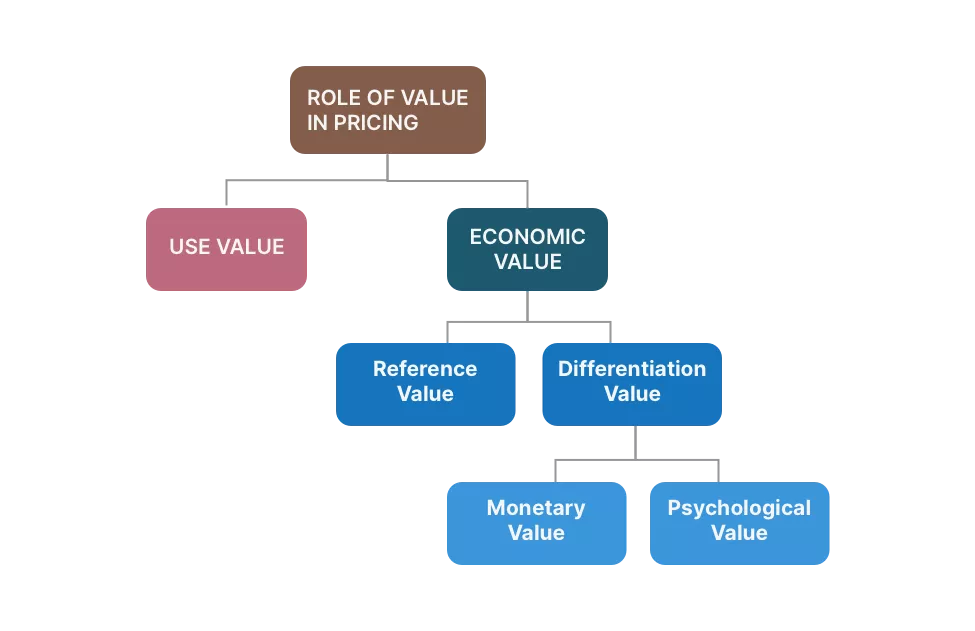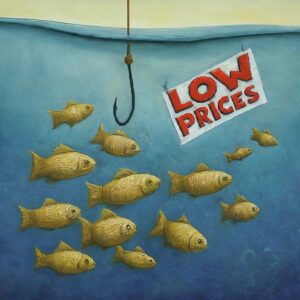The term value commonly refers to the overall satisfaction that a customer derives from using a product or service. Economists call this use value—the utility gained from the use of a product. To give an example, on a hot summer day at the beach, the use value of a cold drink is quite high for most people, perhaps $10 for a cold soda. But few people would actually pay that price. So knowing use value is of little help to a drink vendor. Therefore, it is important to understand the role of economic value in pricing decisions. How can you accurately set prices based on the value that products or services generate for consumers? In the following, we will closely investigate the role of economic value in pricing.
Role of Use Value versus Role of Economic Value in Pricing
As said before, use value refers to the utility gained from the use of a product. But customers know that in most cases, they do not have to pay a seller all that a product is really worth to them. They know that competing sellers will usually offer a better deal at prices closer to what they expect from past experience, like $2.00 for a soda instead of $10.
The difference between the use value of a product and its market price is called the consumer surplus: the difference between the value derived from consuming a good minus what you have to pay for it. Consumers know that some distance away may be a snack shop where beverages cost just $1.50, and that a convenience store selling an entire six-pack for only $3.99 is just a short drive away. Consequently, they will probably reject a very high price even when the product is worth much more to them – and thereby maximize their consumer surplus.
Thus, use value is of limited help for determining ideal prices. However, the role of economics value in pricing is much higher:

The value at the heart of pricing strategy is not use value, but economic value (or exchange value). Economic value depends on the alternatives customers have available to satisfy the same need. Few people will pay $2 for a cola, even if its use value is $10, if they think the market offers alternatives at substantially lower prices. On the other hand, only a small segment of customers insist on buying the lowest-priced alternative. It is likely that many people would pay $2.00 for a cola from the drink vendor strolling the beach despite the availability of the same product for less at a snack shop or convenience store because the seller is providing a differentiated product offering worth more than the alternatives to some segments. How much more depends on the economic value customers place on not having to walk up the beach to the snack shop or not having to drive to the convenience store. Some are willing to pay more for convenience, while others who wouldn’t mind a jog along the beach, the premium they will pay for convenience will be much less. To appeal to that jogger segment, the mobile vendor would need to differentiate the offering in some other way that joggers value highly.
Economic value accounts for the fact that the value one can capture for commodity attributes of an offer is limited to whatever competitors charge for them. Only the part of economic value associated with differentiation, called differentiation value, can be captured in the price.
Differentiation value comes in two forms: monetary and psychological, both of which may be instrumental in shaping a customer’s choice but require very different approaches to estimate them. Monetary value represents the total savings or income increases that a customer accrues as a result of purchasing the product. Psychological value refers to the ways that a product creates innate satisfaction for the customer.
A product’s total economic value is calculated as the price of the customer’s best alternative (the reference value) plus the worth of whatever differentiates the offering from the alternative (the differentiation value). Total economic value is the maximum price that a fully informed, value-maximizing consumer would pay.
Obviously, not every consumer is fully informed and value-maximizing. Often product and service users, and particularly purchasing agents buying on the users’ behalf, may not recognize the actual economic value they receive from an offering. That is, the offering’s perceived value to a buyer may fall short of the economic value if the buyer is uninformed. Therefore, it’s critical that a company’s sales and marketing communications ensure that features likely to be important to the buyer come to the buyer’s attention.
Learn how to estimate economic value: Economic Value Estimation.








